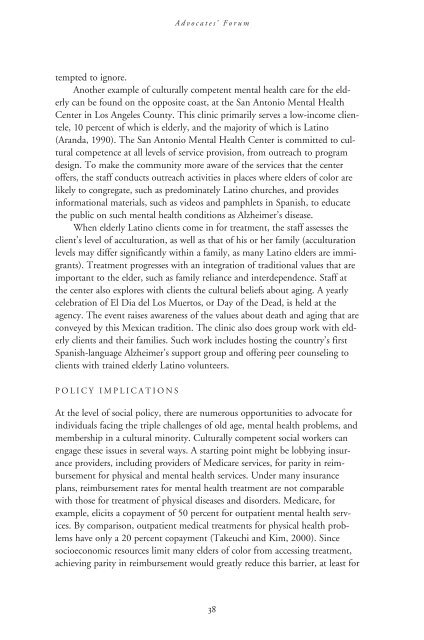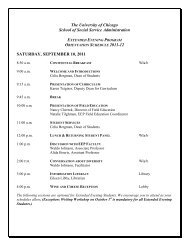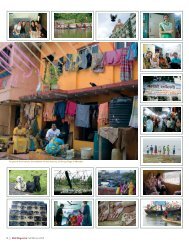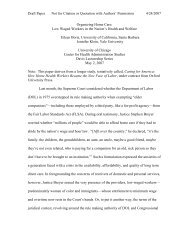2004 - School of Social Service Administration - University of Chicago
2004 - School of Social Service Administration - University of Chicago
2004 - School of Social Service Administration - University of Chicago
Create successful ePaper yourself
Turn your PDF publications into a flip-book with our unique Google optimized e-Paper software.
Advocates’ Forum<br />
tempted to ignore.<br />
Another example <strong>of</strong> culturally competent mental health care for the elderly<br />
can be found on the opposite coast, at the San Antonio Mental Health<br />
Center in Los Angeles County. This clinic primarily serves a low-income clientele,<br />
10 percent <strong>of</strong> which is elderly, and the majority <strong>of</strong> which is Latino<br />
(Aranda, 1990). The San Antonio Mental Health Center is committed to cultural<br />
competence at all levels <strong>of</strong> service provision, from outreach to program<br />
design. To make the community more aware <strong>of</strong> the services that the center<br />
<strong>of</strong>fers, the staff conducts outreach activities in places where elders <strong>of</strong> color are<br />
likely to congregate, such as predominately Latino churches, and provides<br />
informational materials, such as videos and pamphlets in Spanish, to educate<br />
the public on such mental health conditions as Alzheimer’s disease.<br />
When elderly Latino clients come in for treatment, the staff assesses the<br />
client’s level <strong>of</strong> acculturation, as well as that <strong>of</strong> his or her family (acculturation<br />
levels may differ significantly within a family, as many Latino elders are immigrants).<br />
Treatment progresses with an integration <strong>of</strong> traditional values that are<br />
important to the elder, such as family reliance and interdependence. Staff at<br />
the center also explores with clients the cultural beliefs about aging. A yearly<br />
celebration <strong>of</strong> El Dia del Los Muertos, or Day <strong>of</strong> the Dead, is held at the<br />
agency. The event raises awareness <strong>of</strong> the values about death and aging that are<br />
conveyed by this Mexican tradition. The clinic also does group work with elderly<br />
clients and their families. Such work includes hosting the country’s first<br />
Spanish-language Alzheimer’s support group and <strong>of</strong>fering peer counseling to<br />
clients with trained elderly Latino volunteers.<br />
POLICY IMPLICATIONS<br />
At the level <strong>of</strong> social policy, there are numerous opportunities to advocate for<br />
individuals facing the triple challenges <strong>of</strong> old age, mental health problems, and<br />
membership in a cultural minority. Culturally competent social workers can<br />
engage these issues in several ways. A starting point might be lobbying insurance<br />
providers, including providers <strong>of</strong> Medicare services, for parity in reimbursement<br />
for physical and mental health services. Under many insurance<br />
plans, reimbursement rates for mental health treatment are not comparable<br />
with those for treatment <strong>of</strong> physical diseases and disorders. Medicare, for<br />
example, elicits a copayment <strong>of</strong> 50 percent for outpatient mental health services.<br />
By comparison, outpatient medical treatments for physical health problems<br />
have only a 20 percent copayment (Takeuchi and Kim, 2000). Since<br />
socioeconomic resources limit many elders <strong>of</strong> color from accessing treatment,<br />
achieving parity in reimbursement would greatly reduce this barrier, at least for<br />
38
















